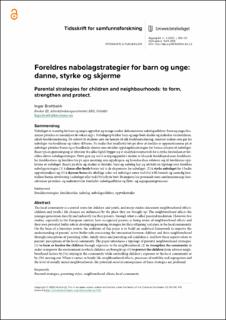Foreldres nabolagstrategier for barn og unge: danne, styrke og skjerme
Peer reviewed, Journal article
Published version
Permanent lenke
https://hdl.handle.net/11250/3018367Utgivelsesdato
2022-04-04Metadata
Vis full innførselSamlinger
Originalversjon
Tidsskrift for samfunnsforskning. 2022, 63 (2), 102-121. https://doi.org/10.18261/tfs.63.2.2Sammendrag
Nabolaget er vesentlig for barn og unges oppvekst, og mange studier dokumenterer nabolagseffekter: barn og unges livssjanser påvirkes av nærmiljøet de vokser opp i. Nabolaget påvirker barn og unge både direkte og indirekte via foreldrene, såkalt foreldremediering. De relativt få studiene som tar hensyn til slik foreldremediering, studerer lenken som går fra nabolaget via foreldrene og videre til barna. Få studier har imidlertid tatt på alvor at foreldre er oppmerksomme på at nabolaget påvirker barna og er handlende aktører som utvikler oppdragelsesstrategier for barnas relasjon til nabolaget. Basert på en gjennomgang av litteratur fra ulike fagfelt bygger jeg et analytisk rammeverk for å styrke forståelsen av foreldres aktive nabolagsstrategier. Dette gjør jeg ved å ta utgangspunkt i studier av klassede foreldrepraksiser, foreldrestiler, foreldrestress og foreldres tro på egen mestring som oppdragere, og hvordan disse relaterer seg til foreldrenes opplevelse av nabolaget. Basert på dette og studier av foreldre, barn og nabolag har jeg utviklet en typologi over foreldres nabolagsstrategier (1) å danne eller herde barna ved at de eksponeres for nabolaget, (2) å styrke nabolaget for å bedre oppvekstmiljøet og (3) å skjerme barna fra uheldige sider ved nabolaget enten ved (3a) å bli boende og samtidig kontrollere barnas involvering i nabolaget eller ved (3b) å flytte bort. Strategiene har potensielt store samfunnsmessige konsekvenser på mikro- og makronivå for familieliv, nabolagseffekter og flytte- og segregasjonsprosesser. The local community is a central arena for children and youth, and many studies document neighbourhood effects: children and youth’s life chances are influenced by the place they are brought up. The neighbourhood affects the younger generation directly and indirectly via their parents, through what is called parental mediation. However, few studies, especially in the European context, have recognized parents as being aware of neighbourhood effects and their own potential buffer role in developing parenting strategies for their offspring’s relation to the local community. On the basis of a literature review, the ambition of this paper is to build an analytical framework to improve the understanding of parents’ active buffer role concerning the interaction between children and their neighbourhood through conceptions of parenting styles, family stress and parenting self-confidence, and how these aspects relate to parents’ perceptions of the local community. The paper introduces a typology of parental neighbourhood strategies: (1) to form or harden the children through exposure to the neighbourhood; (2) to strengthen the community in order to improve the environment in which children are brought up; (3) to protect the children from adverse neighbourhood factors by (3a) staying in the community while controlling children’s exposure to the local community or by (3b) moving out. When it comes to family life, neighbourhood effects, processes of mobility and segregation and the level of socially mixed neighbourhoods, the potential societal consequences of these strategies are profound.

